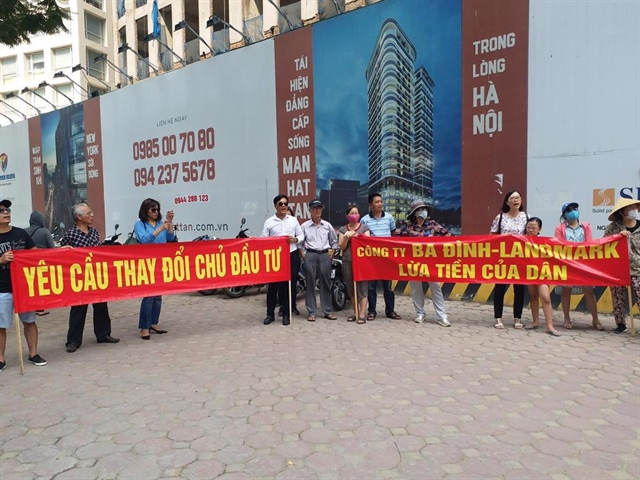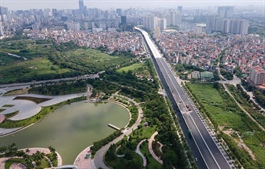Property business suspension makes realty market healthier: Specialists
Property business suspension makes realty market healthier: Specialists
Banning underperforming property developers is imperative to making the property market healthier.
Developers who misoperate apartment buildings in Hanoi will not be allowed to execute new projects.

Apartment buyers protest in front of a property project in Hanoi. Photo: The Hanoi Times |
According to the Hanoi Department of Construction, the city now has more than 1,100 apartment buildings and condominiums. The dwellers have elected 804 administration boards to oversee building developers.
Of those figures, 723 developers have handed over all documents to their building management boards while 567 building operators have reported maintenance fund data, and more than 700 developers have completed the construction of public spaces in apartment buildings.
Figures show that more than 80% of apartment buildings are in good use, while residents of the rest continue to struggle with misuse and waste of the maintenance fund by developers, and the construction of substandard public spaces.
Despite numerous measures taken by local authorities, these problems have existed for years and have harmed the rights and profits of apartment owners. Several companies have been fined for their violations, including Xuan Mai Construction and Investment JSC, Videc Group JSC, and Nam Mekong Group JSC.
The ban on incapable property developers is "a wise move" to strengthen their responsibilities and create a fair competitive market among property companies, said lawyer Dang Van Cuong, head of Chinh Phap law firm.
Technically, a property developer becomes the major contractor of a project if the company is capable of meeting detailed requirements set by the project owner and the law, Cuong said. "Developers must demonstrate their capability through their existing projects," he said. "It is risky to allow the developer who fails to meet the standards or whose housing projects are behind schedule."
Dang Hung Vo, former Deputy Minister of Natural Resources and Environment, said Hanoi's strong new measures may give a clean bill of health to the city's real estate market.
According to him, the main problems of housing projects in Hanoi are inefficient implementation of construction plans, poor project management leading to land abandonment, and complicated processes of granting land use certificates.
"Such problems have worsened Hanoi's image in recent years. So the key task for Hanoi in the near future is to completely solve them," he emphasized.
Vo said the ban if it comes to pass, signals a progressive move by Hanoi's legislative body and will amend weaknesses and mistakes, as well as strengthen the local real estate market.
"The municipal authorities should get rid of their 'group interest' thinking and take the measure seriously," he suggested. "When the real estate market is in good health, market prices will be more reasonable and affordable for people."
If developers and investors are able to run their projects correctly, there will be an end to broken rules and conflicts between homebuyers and investors, he said.
Hopefully, Hanoi will set an example with the move for other provinces and cities to follow, Vo added.

























